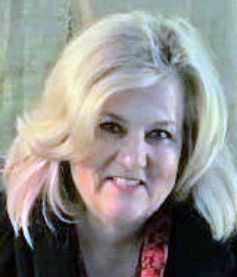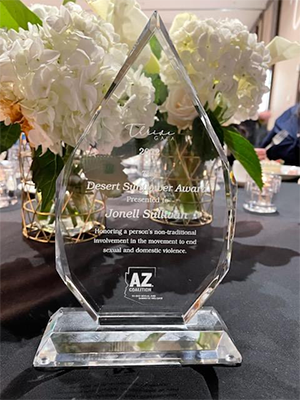DES Child Support Administrator Honored for Championing Domestic Violence Prevention

DES Division of Child Support Services (DCSS) Operations Administrator, Jonell Sullivan, was recently awarded the Desert Sunflower Award by the Arizona Coalition to End Sexual and Domestic Violence (ACESDV) for her work championing domestic violence prevention within the practices of DCSS. DCSS Assistant Director, Heather Noble, accepted the award on her behalf during the Thrive Gala held at Hyatt Regency Gainey Ranch Resort.
“Like the surprising sight of these yellow flowers in a desert environment, the Desert Sunflower Award recognizes an individual’s nontraditional involvement in the movement to end sexual and/or domestic violence,” according to the Arizona Coalition to End Sexual and Domestic Violence.
Since 2016, Jonell has been integral throughout the Procedural Justice-Informed Alternatives to Contempt (PJAC) Grant implementation in Arizona, which involved a deep dive into the impact of domestic violence within child support cases. “We’ve looked at some of our processes and communications to remove danger factors to our families,” Jonell explained of the many procedures she and her teams have implemented. Her work has assured that DCSS caseworkers can recognize, respond to, and provide referrals for domestic violence survivors.
Caseworkers Recognize Domestic Violence Survivors

Jonell has nurtured partnerships to answer the call to prevent domestic violence among families DCSS serves every day and others around the community. “DCSS serves almost 140,000 families where family violence is indicated in just under 40% of those cases,” Heather explained. Family and domestic violence policies and mandatory staff training has helped improve DCSS employees' awareness and ability to identify a survivor, and most importantly, equip them with resources to help someone in danger find safety.
Case managers are trained to review and discuss a questionnaire with each client to determine if there has been a history of family or domestic violence. If the results indicate that violence has likely occurred, Non-Disclosure Indicator (NDI) messages are triggered in the DCSS database that alert DCSS and Attorney General's Office staff who handle the case to take extra precautions to protect the client’s information and provide an opportunity to refer them to an advocate. DCSS staff are also equipped with resources they can use to refer victims to services, like helplines through the ACESDV. “We’ve made a complex system more manageable for case workers to provide support to DV customers,” said Jonell. She added that her teams focus on various methods to keep the courts informed of cases with NDI to provide an additional barrier for abusers to gain access to their victims.
Protecting Case Workers
As DCSS developed these procedures, Jonell also addressed concerns about staff who may be involved in a domestic violence situation themselves, building a process for teams to also seek support. Some of the trainings can be triggers for those experiencing domestic violence personally, and DCSS wanted to ensure they were able to take care of their team, so they could, in turn, support their customer’s needs. In addition, “It was really important that we protect our case managers from potentially violent customers so we put protocols in place,” said Jonell. She was inspired to design tear-off sheets with helpline information to place in public and staff restroom stalls in DCSS offices. “Once private sector organizations who work with survivors saw them, they were in high demand. We’ve also had private businesses ask for them. The [federal] Office of Child Support Enforcement [OCSE] has recently created a similar tear-off tab and have released them to all states.”
Domestic Violence Awareness Outside DCSS
Through ACESDV, Jonell offered external training for partner organizations such as police departments, domestic violence shelters and advocates operating domestic violence hotlines through a course known as ‘Child Support 101 for the Domestic Violence Advocate,’ which provided an overview of DCSS NDI services and limitations.
Although Jonell is the Desert Sunflower Honoree, she is avid about sharing the credit with those who have supported her work throughout the years, including DCSS teams and the close partnerships she’s held with members of ACESDV and OCSE. “[Jonell] has been so open to any feedback, making changes in her words or thoughts about how we think about survivors that it has made my work with DCSS easier and the work that has been done with DCSS better,” said Samantha Hinchey, ACESDV Domestic Violence Response Coordinator.
If you or someone you know has been impacted by domestic violence, the DES Domestic Violence Program and ACESDV are available to help. If you are in need of child support services, DCSS can assist you.

